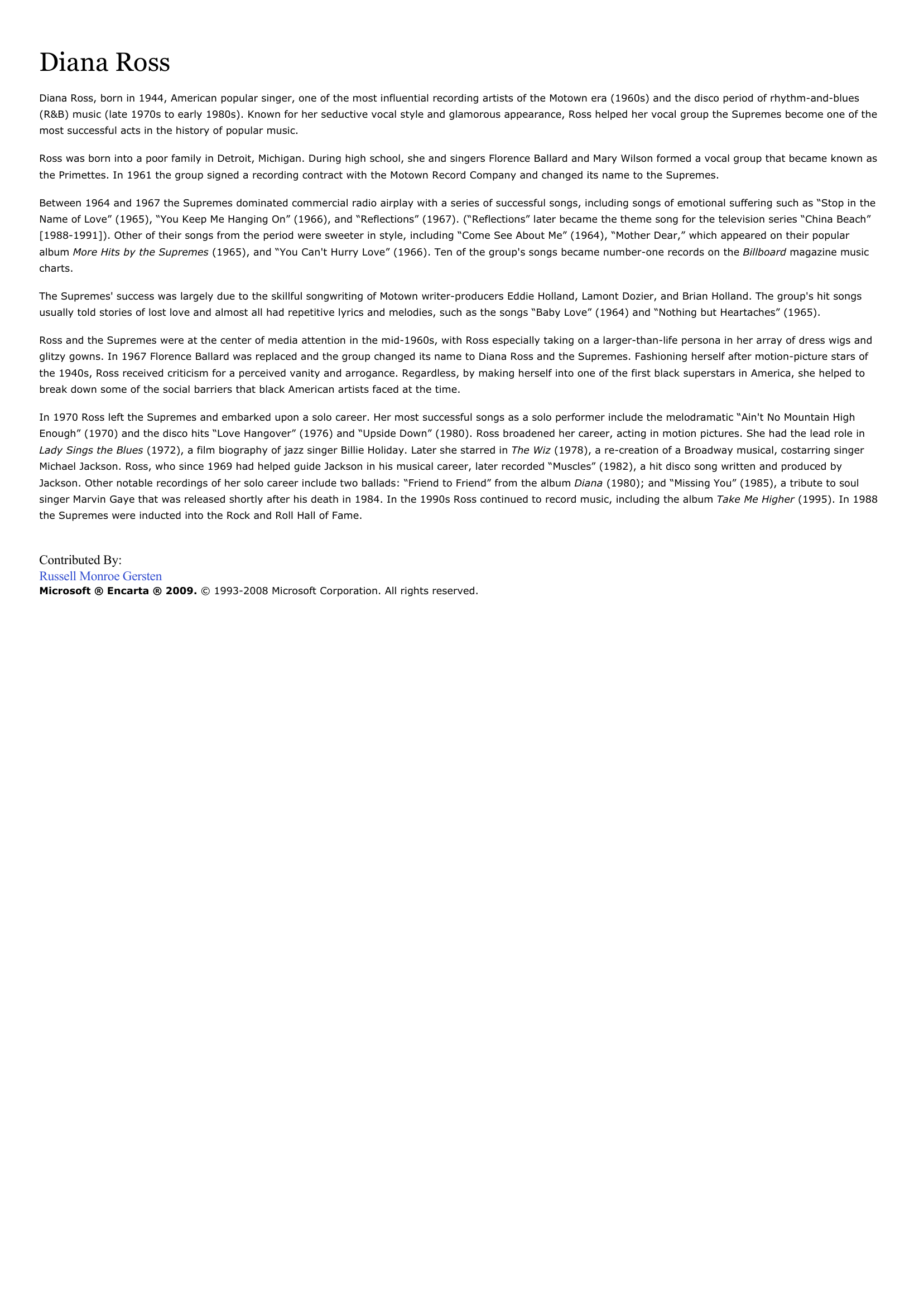Ross Diana
Publié le 31/03/2019
Extrait du document

Ross Diana
Chanteuse américaine
* 26.4.1944, Detroit, Michigan
Avec deux amies d'école, elle fonde, dans les années 60, les Supremes, groupe de musique soul dont les morceaux s'installent durablement dans les hits parades (\"Stop in the name of love\", \"Back in my arms again\"). A partir de 1969, elle se produit sous son propre nom, d'abord dans le registre soul (\"Ain't no mountain high enough\" ; \"Do you know where you're going to\", tiré de la bande originale du film \"Mahogany\", 1975 ; \"Love hangover\"), puis, vers les années 80, dans un style plus commercial et diversifié. \"Upside down\", ainsi que certains titres écrits pour elle par Michael Jackson (\"Muscles\", \"Eaten alive\") font le bonheur des discothèques du monde entier. En 1971, Diana Ross interprète le rôle de la chanteuse de jazz Billie Holiday dans le film intitulé \"Lady sings the blues\".

«
Powered by TCPDF (www.tcpdf.org)Diana Ross
Diana Ross , born in 1944, American popular singer, one of the most influential recording artists of the Motown era (1960s) and the disco period of rhythm-and-blues (R&B) music (late 1970s to early 1980s).
Known for her seductive vocal style and glamorous appearance, Ross helped her vocal group the Supremes become one of themost successful acts in the history of popular music.
Ross was born into a poor family in Detroit, Michigan.
During high school, she and singers Florence Ballard and Mary Wilson formed a vocal group that became known asthe Primettes.
In 1961 the group signed a recording contract with the Motown Record Company and changed its name to the Supremes.
Between 1964 and 1967 the Supremes dominated commercial radio airplay with a series of successful songs, including songs of emotional suffering such as “Stop in theName of Love” (1965), “You Keep Me Hanging On” (1966), and “Reflections” (1967).
(“Reflections” later became the theme song for the television series “China Beach”[1988-1991]).
Other of their songs from the period were sweeter in style, including “Come See About Me” (1964), “Mother Dear,” which appeared on their popularalbum More Hits by the Supremes (1965), and “You Can't Hurry Love” (1966).
Ten of the group's songs became number-one records on the Billboard magazine music charts.
The Supremes' success was largely due to the skillful songwriting of Motown writer-producers Eddie Holland, Lamont Dozier, and Brian Holland.
The group's hit songsusually told stories of lost love and almost all had repetitive lyrics and melodies, such as the songs “Baby Love” (1964) and “Nothing but Heartaches” (1965).
Ross and the Supremes were at the center of media attention in the mid-1960s, with Ross especially taking on a larger-than-life persona in her array of dress wigs andglitzy gowns.
In 1967 Florence Ballard was replaced and the group changed its name to Diana Ross and the Supremes.
Fashioning herself after motion-picture stars ofthe 1940s, Ross received criticism for a perceived vanity and arrogance.
Regardless, by making herself into one of the first black superstars in America, she helped tobreak down some of the social barriers that black American artists faced at the time.
In 1970 Ross left the Supremes and embarked upon a solo career.
Her most successful songs as a solo performer include the melodramatic “Ain't No Mountain HighEnough” (1970) and the disco hits “Love Hangover” (1976) and “Upside Down” (1980).
Ross broadened her career, acting in motion pictures.
She had the lead role inLady Sings the Blues (1972), a film biography of jazz singer Billie Holiday.
Later she starred in The Wiz (1978), a re-creation of a Broadway musical, costarring singer Michael Jackson.
Ross, who since 1969 had helped guide Jackson in his musical career, later recorded “Muscles” (1982), a hit disco song written and produced byJackson.
Other notable recordings of her solo career include two ballads: “Friend to Friend” from the album Diana (1980); and “Missing You” (1985), a tribute to soul singer Marvin Gaye that was released shortly after his death in 1984.
In the 1990s Ross continued to record music, including the album Take Me Higher (1995).
In 1988 the Supremes were inducted into the Rock and Roll Hall of Fame.
Contributed By:Russell Monroe GerstenMicrosoft ® Encarta ® 2009. © 1993-2008 Microsoft Corporation.
All rights reserved..
»
↓↓↓ APERÇU DU DOCUMENT ↓↓↓
Liens utiles
- Ross Diana Chanteuse américaine
- RANCILLAC Bernard D iana R oss Né à Paris, 1931 D e 1972 à 1976, Bernard Rancillac a portraituré u ne q uarantaine d e musiciens d e jazz tels q ue Charlie Parker, Miles Davis ou, ici, Diana Ross.
- Diana Ross Diana Ross, born in 1944, American popular singer, one of the most influential recording artists of the Motown era (1960s) and the disco period of rhythm-and-blues (R&B) music (late 1970s to early 1980s).
- Ross, Diana.
- Diana Ross.

































